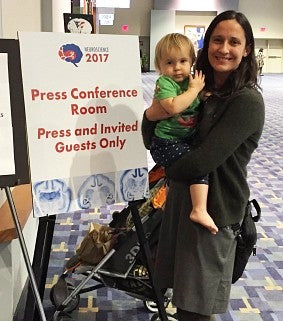She had been to conferences before, but Nicole Swann was unprepared for the challenges she faced when she attended the largest conference in her field.
It wasn't the science that got to her. It was juggling her time with a 5-month-old baby girl, even with support from her family.

At the time of that conference, in fall 2016, the native of Austin, Texas, was a postdoctoral researcher at the University of California, San Francisco.
"Conferences are important. When you are young and trying to establish your career, having face-to-face interaction with people in your field is really critical," said Swann, whose research at the UO focuses on interactions between brain regions in the motor system and how they are disrupted in Parkinson's disease. "You are trying to make a name for yourself and establish that you are an expert. If you are never seen, you are missing out on something."
All early career academic parents, not just women, face a financial hurdle in arranging on-site or home childcare so they can attend conferences, she said, but women tend to be affected more.
"You don't notice it as much during graduate school or and as a postdoc, but when you become an assistant professor and look around, you see there's not very many of us," she said. "A lot of women have told me that family is the reason they are concerned about continuing in academia. Many view it as not being very family friendly."
Swann is not alone in that line of thinking.
“Female graduate students and postdoctoral fellows who have babies while students or fellows are more than twice as likely as new fathers or than childless women to turn away from an academic research career,” wrote Mary Ann Mason, a professor at the University of California, Berkeley in an essay for Slate in June 2013.
Swann’s experience blossomed into a collaboration of 46 women last year. Returning to the same conference, she and others replied to a Twitter post related to accommodations for women and families at the conference. They started a larger conversation about what more could be done to improve resources for childcare and lactation needs at conferences.
The results of women’s brainstorming have landed.
Rebecca Calisi of the University of California, Davis posted the original Twitter comment, and she detailed her own experiences and noted the problems in an essay in the Feb. 16 issue of the journal Science. Now, in an opinion paper published online March 5 by the Proceedings of the National Academy of Sciences, Calisi put forth the group’s suggested solutions.
Their four-pronged proposal is called CARE, which stands for childcare, accommodate families, resources and establish social networks.
In short, the four general points are:
Conference organizers and scientific societies should consider allocating funds, as a subsidy or grant, to conference attendees to help defray the costs of childcare either onsite or for arranging care assistance back home.
Conferences should accommodate families with family-friendly policies, events and scheduling, including welcoming families to some social events. Such an approach would reduce stress and allow young parents to increase their conference involvement.
Conferences should consider offering resources such as strategically located lactation facilities with appropriate resources, baby-changing areas and spaces for parents and caregivers to easily use.
Conferences could establish online parent-caregiver social networks to foster communication among attendees who bring children. This could help parents avoid social isolation and facilitate arranging kid-friendly meetups and activities, babysitting and childcare swaps.
"Our paper is meant to help conference organizers make their events more family friendly," Swann said. "It isn't meant as an all-or-nothing manual."
She said it is better for conferences to adopt some of these strategies even if they can't adopt them all right away. If academic conferences would adopt some of these practices, she added, it would send a powerful message of inclusion and help address the gender imbalance in academia.
—By Jim Barlow, University Communications


